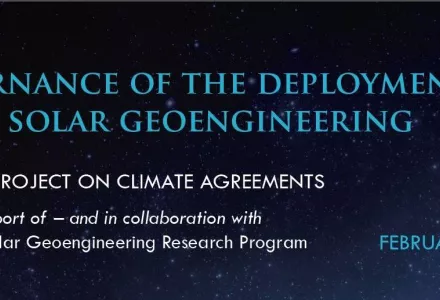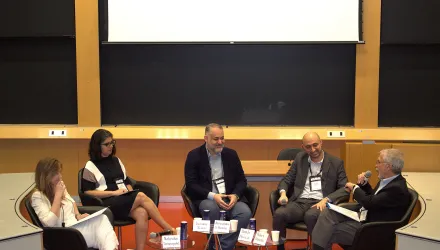With the support of — and in collaboration with Harvard’s Solar Geoengineering Research Program
Overview
The Harvard Project on Climate Agreements has released a volume of 26 briefs that explores a range of topics related to how we might govern the deployment of solar geoengineering. “Solar geoengineering” (SG) refers to the deliberate alteration of the earth’s radiative balance in order to reduce the risks attributed to the accumulation of greenhouse gases in the atmosphere. The method most commonly discussed as technically plausible and potentially effective involves adding aerosols to the lower stratosphere, where they would reflect some (~1%) incoming sunlight back to space.
This type of SG — and possibly some others — are associated with incentive structures that are the inverse of those for reducing greenhouse-gas emissions. The latter is a global commons problem, the structure of which requires cooperation at the highest jurisdictional level (that is, international cooperation) in order to advance mitigation adequately. It has been challenging to design and implement institutions and agreements to support such multilateral cooperation.
In contrast, certain types of SG can — in principle — be implemented effectively at relatively low financial cost — low enough to be borne by small states or non-state entities acting on their own. The impacts of such action, however, might be substantial, at regional or even global scales. These could include the intended beneficial effect — decreased global average surface temperature — plus other, potentially adverse side effects. Given the incentive structure associated with SG, its potentially substantial impacts, and the uncertainty (of various kinds) surrounding it, the governance of SG deployment will also be difficult — though the challenges will be quite different from those associated with encouraging emissions reduction.
With this in mind, in September 2018, the Harvard Project on Climate Agreements hosted a workshop on “Governance of the Deployment of Solar Geoengineering,” with collaboration and support from Harvard’s Solar Geoengineering Research Program (HSGRP). Participants included 26 leading academic researchers addressing the workshop’s topic — as well as scholars who had considered the governance of other international regimes that might provide lessons and insights. The briefs in this volume are based in large part on presentations by the authors at the workshop.
























